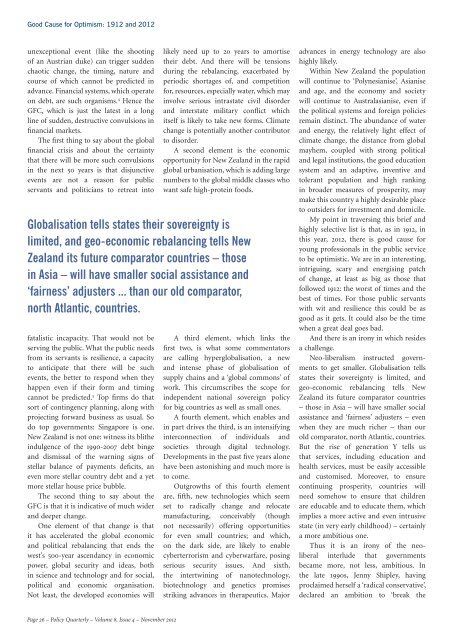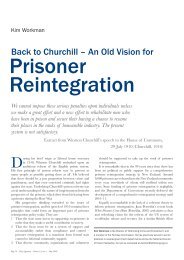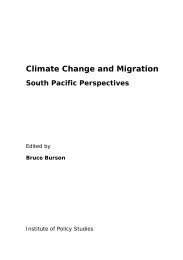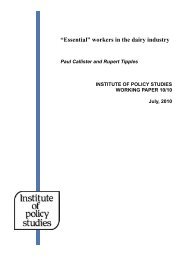PDF File - Institute for Governance and Policy Studies - Victoria ...
PDF File - Institute for Governance and Policy Studies - Victoria ...
PDF File - Institute for Governance and Policy Studies - Victoria ...
Create successful ePaper yourself
Turn your PDF publications into a flip-book with our unique Google optimized e-Paper software.
Good Cause <strong>for</strong> Optimism: 1912 <strong>and</strong> 2012<br />
unexceptional event (like the shooting<br />
of an Austrian duke) can trigger sudden<br />
chaotic change, the timing, nature <strong>and</strong><br />
course of which cannot be predicted in<br />
advance. Financial systems, which operate<br />
on debt, are such organisms. 4 Hence the<br />
GFC, which is just the latest in a long<br />
line of sudden, destructive convulsions in<br />
financial markets.<br />
The first thing to say about the global<br />
financial crisis <strong>and</strong> about the certainty<br />
that there will be more such convulsions<br />
in the next 50 years is that disjunctive<br />
events are not a reason <strong>for</strong> public<br />
servants <strong>and</strong> politicians to retreat into<br />
fatalistic incapacity. That would not be<br />
serving the public. What the public needs<br />
from its servants is resilience, a capacity<br />
to anticipate that there will be such<br />
events, the better to respond when they<br />
happen even if their <strong>for</strong>m <strong>and</strong> timing<br />
cannot be predicted. 5 Top firms do that<br />
sort of contingency planning, along with<br />
projecting <strong>for</strong>ward business as usual. So<br />
do top governments: Singapore is one.<br />
New Zeal<strong>and</strong> is not one: witness its blithe<br />
indulgence of the 1990-2007 debt binge<br />
<strong>and</strong> dismissal of the warning signs of<br />
stellar balance of payments deficits, an<br />
even more stellar country debt <strong>and</strong> a yet<br />
more stellar house price bubble.<br />
The second thing to say about the<br />
GFC is that it is indicative of much wider<br />
<strong>and</strong> deeper change.<br />
One element of that change is that<br />
it has accelerated the global economic<br />
<strong>and</strong> political rebalancing that ends the<br />
west’s 500-year ascendancy in economic<br />
power, global security <strong>and</strong> ideas, both<br />
in science <strong>and</strong> technology <strong>and</strong> <strong>for</strong> social,<br />
political <strong>and</strong> economic organisation.<br />
Not least, the developed economies will<br />
likely need up to 20 years to amortise<br />
their debt. And there will be tensions<br />
during the rebalancing, exacerbated by<br />
periodic shortages of, <strong>and</strong> competition<br />
<strong>for</strong>, resources, especially water, which may<br />
involve serious intrastate civil disorder<br />
<strong>and</strong> interstate military conflict which<br />
itself is likely to take new <strong>for</strong>ms. Climate<br />
change is potentially another contributor<br />
to disorder.<br />
A second element is the economic<br />
opportunity <strong>for</strong> New Zeal<strong>and</strong> in the rapid<br />
global urbanisation, which is adding large<br />
numbers to the global middle classes who<br />
want safe high-protein foods.<br />
Globalisation tells states their sovereignty is<br />
limited, <strong>and</strong> geo-economic rebalancing tells New<br />
Zeal<strong>and</strong> its future comparator countries – those<br />
in Asia – will have smaller social assistance <strong>and</strong><br />
‘fairness’ adjusters ... than our old comparator,<br />
north Atlantic, countries.<br />
A third element, which links the<br />
first two, is what some commentators<br />
are calling hyperglobalisation, a new<br />
<strong>and</strong> intense phase of globalisation of<br />
supply chains <strong>and</strong> a ‘global commons’ of<br />
work. This circumscribes the scope <strong>for</strong><br />
independent national sovereign policy<br />
<strong>for</strong> big countries as well as small ones.<br />
A fourth element, which enables <strong>and</strong><br />
in part drives the third, is an intensifying<br />
interconnection of individuals <strong>and</strong><br />
societies through digital technology.<br />
Developments in the past five years alone<br />
have been astonishing <strong>and</strong> much more is<br />
to come.<br />
Outgrowths of this fourth element<br />
are, fifth, new technologies which seem<br />
set to radically change <strong>and</strong> relocate<br />
manufacturing, conceivably (though<br />
not necessarily) offering opportunities<br />
<strong>for</strong> even small countries; <strong>and</strong> which,<br />
on the dark side, are likely to enable<br />
cyberterrorism <strong>and</strong> cyberwarfare, posing<br />
serious security issues. And sixth,<br />
the intertwining of nanotechnology,<br />
biotechnology <strong>and</strong> genetics promises<br />
striking advances in therapeutics. Major<br />
advances in energy technology are also<br />
highly likely.<br />
Within New Zeal<strong>and</strong> the population<br />
will continue to ‘Polynesianise’, Asianise<br />
<strong>and</strong> age, <strong>and</strong> the economy <strong>and</strong> society<br />
will continue to Australasianise, even if<br />
the political systems <strong>and</strong> <strong>for</strong>eign policies<br />
remain distinct. The abundance of water<br />
<strong>and</strong> energy, the relatively light effect of<br />
climate change, the distance from global<br />
mayhem, coupled with strong political<br />
<strong>and</strong> legal institutions, the good education<br />
system <strong>and</strong> an adaptive, inventive <strong>and</strong><br />
tolerant population <strong>and</strong> high ranking<br />
in broader measures of prosperity, may<br />
make this country a highly desirable place<br />
to outsiders <strong>for</strong> investment <strong>and</strong> domicile.<br />
My point in traversing this brief <strong>and</strong><br />
highly selective list is that, as in 1912, in<br />
this year, 2012, there is good cause <strong>for</strong><br />
young professionals in the public service<br />
to be optimistic. We are in an interesting,<br />
intriguing, scary <strong>and</strong> energising patch<br />
of change, at least as big as those that<br />
followed 1912: the worst of times <strong>and</strong> the<br />
best of times. For those public servants<br />
with wit <strong>and</strong> resilience this could be as<br />
good as it gets. It could also be the time<br />
when a great deal goes bad.<br />
And there is an irony in which resides<br />
a challenge.<br />
Neo-liberalism instructed governments<br />
to get smaller. Globalisation tells<br />
states their sovereignty is limited, <strong>and</strong><br />
geo-economic rebalancing tells New<br />
Zeal<strong>and</strong> its future comparator countries<br />
– those in Asia – will have smaller social<br />
assistance <strong>and</strong> ‘fairness’ adjusters – even<br />
when they are much richer – than our<br />
old comparator, north Atlantic, countries.<br />
But the rise of generation Y tells us<br />
that services, including education <strong>and</strong><br />
health services, must be easily accessible<br />
<strong>and</strong> customised. Moreover, to ensure<br />
continuing prosperity, countries will<br />
need somehow to ensure that children<br />
are educable <strong>and</strong> to educate them, which<br />
implies a more active <strong>and</strong> even intrusive<br />
state (in very early childhood) – certainly<br />
a more ambitious one.<br />
Thus it is an irony of the neoliberal<br />
interlude that governments<br />
became more, not less, ambitious. In<br />
the late 1990s, Jenny Shipley, having<br />
proclaimed herself a ‘radical conservative’,<br />
declared an ambition to ‘break the<br />
Page 26 – <strong>Policy</strong> Quarterly – Volume 8, Issue 4 – November 2012













